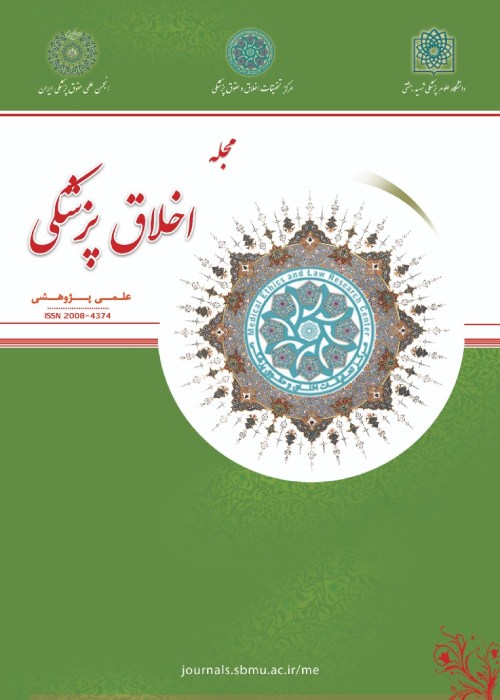Ethics in behavioral science researches: Understanding methodology expert's views
Author(s):
Article Type:
Research/Original Article (دارای رتبه معتبر)
Abstract:
Background And Aim
One of the main concerns in research is its authenticity. The precise identification of research-related ethical issues can help improve the quality of researches conducted by graduate students and increase their reliability. The nature of some disciplines in different fields, as far as dealing with human beings, their cultural, social, and behavioral occasions can create some research areas in which the researcher needs to observe ethical principles related to these fields. Researchers need to observe ethical principles and values in the various stages of their research. The disciplines of behavioral science, due to their different research nature, require researcher to adhere to some common ethical principles. The present research addresses the various ethical dimensions of behavioral science research.Materials And Methods
The present research was conducted in the qualitative approach framework and using analytical content analysis. A semi-structured interview was used to obtain components and indicators of ethics in the research process. The research population consisted of Tehran universities professors of the research methodologies in the behavioral sciences fields. A total of 15 professors were selected using purposive sampling and snowball method. All the participants were informed about time and place of interviews in advance. The duration of each session varied from 20 minutes to more than an hour. Data analysis was performed using deductive content analysis and open categorical source coding method. To ensure the accuracy of the study, the criteria of Guba &Lincoln (1985) were used.Ethical considerations: Respect for privacy and confidentiality, voluntary participation, awareness of the research purpose, respect for the rights and dignity of individuals were among ethical considerations. Participants consent was taken before recording and taking notes and they were assured that the information obtained would be published totally.
Findings: Ethical components in the process of behavioral science research were achieved in the following five stages: ethics in the selection and explanation of the problem (correct identification of the problem; the statement of reality and lack of distortion of facts while selecting the subject; the ability and expertise to perform the research; the importance and necessity of the problem), ethics in data collection (sampling method and validity of research sample; accuracy in data collection), The use of appropriate and standard instruments; non-bias; respect for privacy and confidentiality; respect for participant's rights and informed consent), ethics in the analysis and interpretation of data (authenticity and accuracy of data; honoring the trust, avoiding data fabrication; use of appropriate analytical methods; tolerance and avoid distortion of results); ethics in compiling and publishing results (no distortion of the report; non-copying; considering the rights of all authors; respect for the dignity of the participants in the research; citing credible scientific sources; trusted citations and direct and indirect quotation; supply of research findings in scientific circles) and "paying attention to values and norms of science", which is considered as the competency for doing research. This characteristic may be regarded as the most important characteristic directing the ethical approach to scientific-research ethics. The internalization of the norms and scientific values develops in a biologically scientific process and is related to the spirit of truth and responsibility in how to achieve scientific discoveries. Commitment to science and its norms were expressed in the experiences of one of the professors as follows: "If one is committed to science, he will surely achieve the science and value of science. If anyone achieves the essence of science, he will be considered a committed person and must be fully aware of topics of his discipline by reading relevant articles and researches. To understand theories, one must be aware of the philosophy of science, the history of science, and the circumstances and realities of his own society, and ultimately equip himself with the scientific method ".
Conclusion
Many researches are being designed and carried out and researchers have little knowledge of the ethics of research. Different fields of science, based on the nature of the research methods used, can embody different ethical principles. Considering the importance of the research results in the fields of behavioral sciences, the findings of the present study, which represent the views of the professors of methodology, can lead researchers to genuine and ethical research that contributes significantly to the development of knowledge boundaries. The ethical issues raised by the research process can be a useful guide for students and researchers in the field of behavioral sciences.Keywords:
Language:
Persian
Published:
Journal of Medical Ethics, Volume:11 Issue: 41, 2017
Pages:
25 to 36
magiran.com/p1772293
دانلود و مطالعه متن این مقاله با یکی از روشهای زیر امکان پذیر است:
اشتراک شخصی
با عضویت و پرداخت آنلاین حق اشتراک یکساله به مبلغ 1,390,000ريال میتوانید 70 عنوان مطلب دانلود کنید!
اشتراک سازمانی
به کتابخانه دانشگاه یا محل کار خود پیشنهاد کنید تا اشتراک سازمانی این پایگاه را برای دسترسی نامحدود همه کاربران به متن مطالب تهیه نمایند!
توجه!
- حق عضویت دریافتی صرف حمایت از نشریات عضو و نگهداری، تکمیل و توسعه مگیران میشود.
- پرداخت حق اشتراک و دانلود مقالات اجازه بازنشر آن در سایر رسانههای چاپی و دیجیتال را به کاربر نمیدهد.
In order to view content subscription is required
Personal subscription
Subscribe magiran.com for 70 € euros via PayPal and download 70 articles during a year.
Organization subscription
Please contact us to subscribe your university or library for unlimited access!


